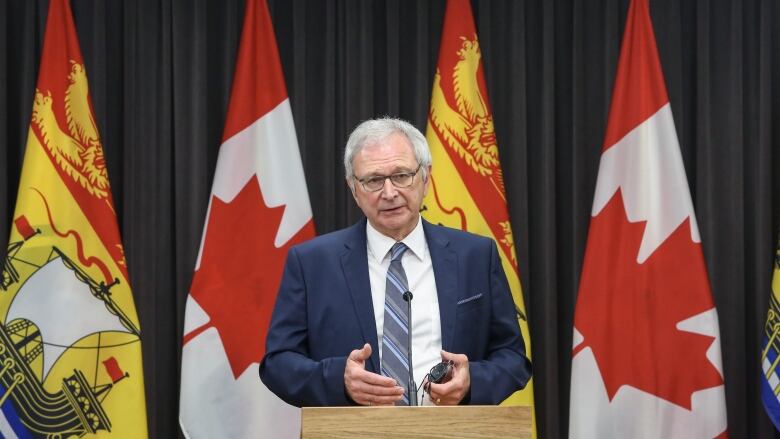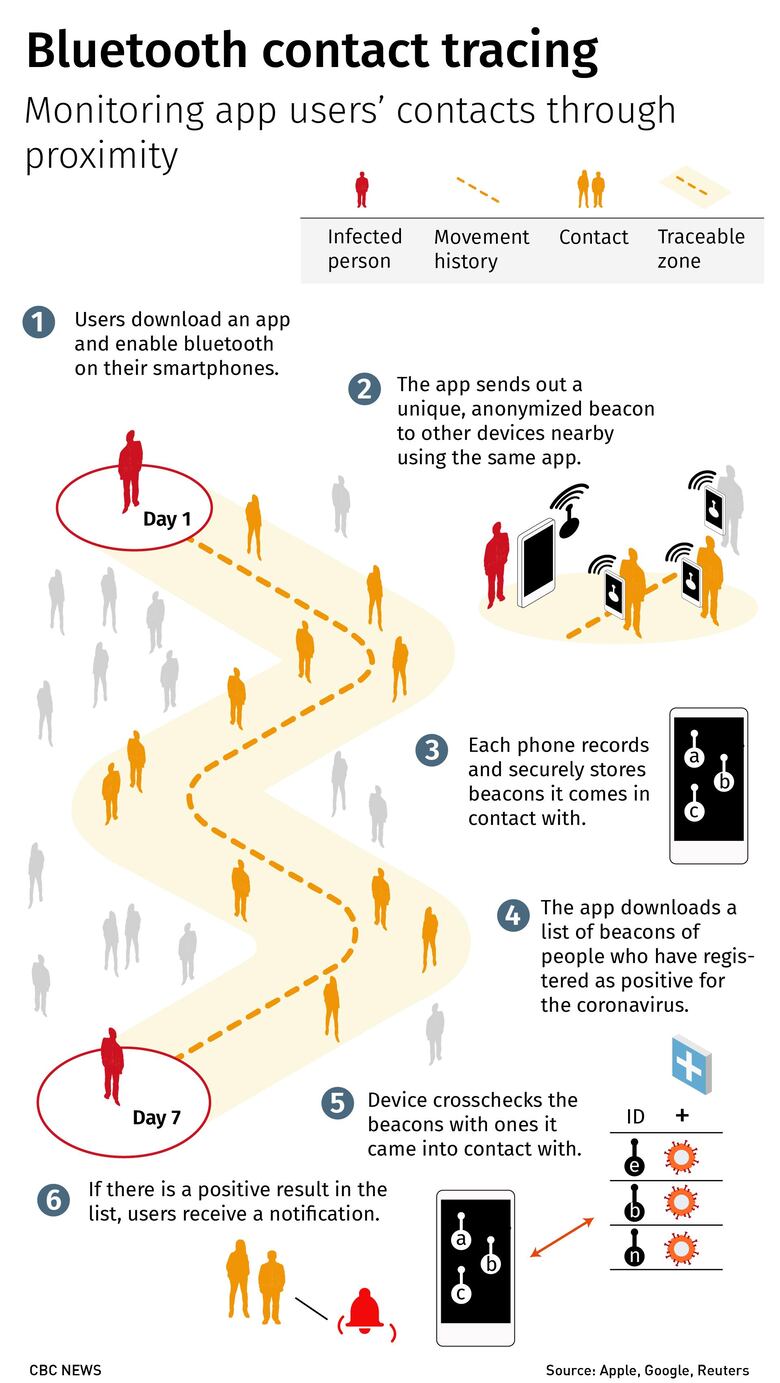Province's plan for COVID-19 contact-tracing app denied by Ottawa
Premier calls decision 'concerning,' suggests New Brunswick app could have launched sooner

Premier Blaine Higgs says plans for a New Brunswick COVID-19 contact-tracing app have been thwarted by the federal government.
"Oh yes, I guess I got clarification that there's one app, and it's a national one," he told reportersFriday following a conference call Thursday night with Prime Minister Justin Trudeau and the other premiers.
The provincial government hasbeen working to developa smartphoneapp thatwould detect and log when a volunteer user is in proximity to other users and notify othersif that person later tests positive for COVID-19.
Butit needs Bluetooth technology provided jointly by Apple and Google to launch.
In an attempt to avoid a patchwork of apps and promote use, Apple and Google are restricting use of their technology to one app per country,leaving some room for exceptions.
Trudeau announced Thursday that a federally-backed appusing the technology will soon begin testing in Ontario, and he hopes to get other provinces on board to make it available countrywide in July.
Higgs called the decision "concerning," given "all the great work that our people have done internally here."
"We felt we could get up and running sooner. We felt we could get into a position and be able to supply a national app," he said.
"We all agreed that it needed to be an app that would allow information sharing. It needed to be one that met all the criteria for privacy. And as long as it had that capability, then what difference did it really make?
"But the federal government has chosen an app. They're going to pay for it. I just hope we can expedite it as quickly as we felt we could otherwise."

Contact tracingtracking people who may have come in contact with an infected person in order to get them tested and isolatedis widely considered criticalto a country'spandemic recovery until a vaccine becomes available.
Under the current manual process, public health workers interview people who test positive for the respiratory diseaseand relyon their ability to remember where they've been in the past several days,who they were near and might have been exposed.
Apps can speed up the laborious process, potentially reduce the number of transmissions and better control the spread.
Trudeau said it will be up toindividual Canadians to decide whether to download the federal app, called COVID Alert, but the higher the uptake, the more effective it will be.
"There are over 30 million smartphones that could take this app in Canada, so we can talk about a significant portion of the Canadian population that could be protected by this app," he said.
How it works
The technology works by having people who test positive upload their results anonymously to the app using a temporary code given to them bya health care provider.
No geotagging will be used and the appwillrun in the background, without rapidly draining aphone's battery, Trudeau has said.
The project has been spearheadedby the Canadian Digital Service, a federal initiative, and theOntario Digital Service, with help from volunteers from the tech firmShopify.
Alberta launched its owncontact-tracing app calledABTraceTogetheron May 1, but some people have raised concerns a patchwork of apps across the country could lead tolow uptake and inconsistent data.
The Alberta app is basedon Singapore's TraceTogether application anduses Bluetooth technology, but only works if everyone involved has the app running on their phone and Bluetooth enabled.
So far, just over 200,000 Albertans have signed up.
Higgsannounced a New Brunswick app was in the worksduring an interview with CBCNews on April 28.
On May 26, he said it was being reviewed nationally.
Privacy recommendations pending
The federal app will undergo a security review by BlackBerry.
The federal privacy commissioner's office isawaiting more information about the appbefore providing recommendations to the government, said spokespersonVito Pilieci.
"We are working diligently and responsibly to develop that advice," he said.
Last month, the federal, provincial and territorial privacy commissioners issued joint guidelines to governments contemplating such apps, describing them as an"extraordinary" measure that raise important privacy risks.
"The choices that our governments make today about how to achieve both public health protection and respect for our fundamental Canadian values, including the right to privacy, will shape the future of our country," they said in a May statement.
They urgedtransparency and accountability.

Corrections
- Based on information provided by Premier Blaine Higgs, an earlier version of this story indicated the province was developing the app in conjunction with the University of New Brunswick. In fact, UNB was not involved.Jun 22, 2020 6:56 PM AT
With files from Catharine Tunney












_(720p).jpg)


 OFFICIAL HD MUSIC VIDEO.jpg)
.jpg)



























































































